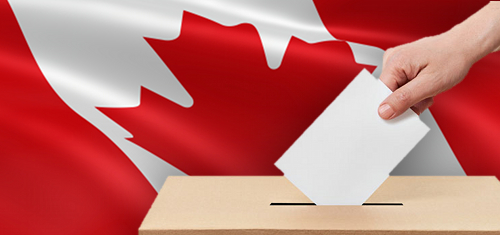 RACE TOO CLOSE TO CALL – LATE DECIDERS WILL CHOOSE WINNER; VOTERS SAY HARPER BEST ON GLOBAL STAGE – NARROWLY SUPPORT TPP
RACE TOO CLOSE TO CALL – LATE DECIDERS WILL CHOOSE WINNER; VOTERS SAY HARPER BEST ON GLOBAL STAGE – NARROWLY SUPPORT TPP
Washington DC (16 Oct 2015) – Four days before Election Day in Canada, the Liberals and the Conservatives are virtually tied in voter support, according to a survey, Canada & the World 2015, conducted 13-15 October by the Democracy Institute, a politically independent think tank. (View a slideshow of the survey results here.)
Justin Trudeau’s Liberals are currently favoured by 34.4 percent of decided voters, with Stephen Harper’s Conservatives backed by 33.6 percent. Tom Mulcair’s New Democratic Party has the support of 25 percent of decided voters, while Gilles Duceppe’s Bloc Québécois and Elizabeth May’s Greens are nationally the choice of 5 percent and 2 percent of voters, respectively.
Polling momentum has been with the Liberals over the past week, and they led the Conservatives during the first two nights (Tuesday and Wednesday) of this survey. However, the Conservatives rebounded significantly among poll respondents on Thursday night, which produced an overall statistical tie for the three nights of polling.
According to poll director Patrick Basham, both Trudeau and Harper can take encouragement from these results. “The Liberals clearly have the political winds at their back in the final week of the campaign,” he said. “However, Conservative voters are more certain of their choice and, critically, appear more likely to show up on polling day.”
At this late stage, 10 percent of the electorate remains undecided. “Those still making up their minds may shift the electoral sands in small but pivotal ways,” argues Basham, who has conducted private polling in Canada, the US, the UK, Australia, East Africa, and the Middle East. “As in any closely-contested race, turnout will be critical to the final outcome,” he notes. Hence, the Conservatives are placing great store in their superior get-out-the-vote campaign.

Other poll highlights focus upon key foreign policy questions. Almost one-third (32%) of voters think Canada punches below her weight on the global stage, while almost half (49 percent) think she punches her weight. Only 19 percent think the country punches above her weight.
Nevertheless, Stephen Harper is viewed as the party leader best able to represent Canada internationally, beating Trudeau by 14 points. “Although Trudeau’s seen as promising prime ministerial material by a growing number of voters, Harper’s viewed as an effective leader internationally,” states Basham. This is especially interesting given that Canadians give a failing grade to the current state of relations with the United States, Canada’s key diplomatic, military, and economic ally. By 45 percent to 27 percent, Canadian voters say Canada-US relations are in a poor state.
Foreign policy support for Harper appears to stem from his hardline stance against foreign and domestic terrorism, which is a significant concern for ordinary Canadians. Respondents overwhelmingly (54 percent) chose terrorism as the biggest threat to Canada’s national security. Basham observes that, “The Canadian prime minister is seen as standing up to the terrorist threat.” Terrorism dwarfed the other alleged threat options, such as Iran, Russia, China, and climate change.
Canadian voters narrowly favour the new Trans Pacific Partnership (TPP) trade deal between Canada, the US, and a host of countries in the Asia Pacific region. By 37 to 32 percent, respondents support the TPP, although almost one in three has no opinion on the agreement. Barack Obama remains well-liked, but no longer loved, by Canadians. A majority (52 percent) of voters still has a favourable opinion of the American president, but his opposition to the Keystone XL pipeline is seen as a contributor to his lower-than-expected approval rating.
Poll Methodology
The fieldwork for this survey of a randomly selected national telephone (landline and mobile) sample of 1,120 Canadian voters was conducted by the Democracy Institute’s polling unit from October 13th to October 13th 2015. The survey was conducted via interactive voice response, in which recorded questions were played for randomly-dialled respondents and answers were given via their telephone keypads. The poll has a margin of error of +/- 3 percent at a 95 percent confidence interval. To ensure a representative sample, the results were weighted for key demographic variables including, but not limited to, gender, age, education, income, region, and mobile phone-only households.
Contact:
Please call +1 202 770 5853 to speak with Patrick Basham about the poll.
Alternatively, please email Patrick Basham at [email protected]; or email the Democracy Institute at [email protected].
